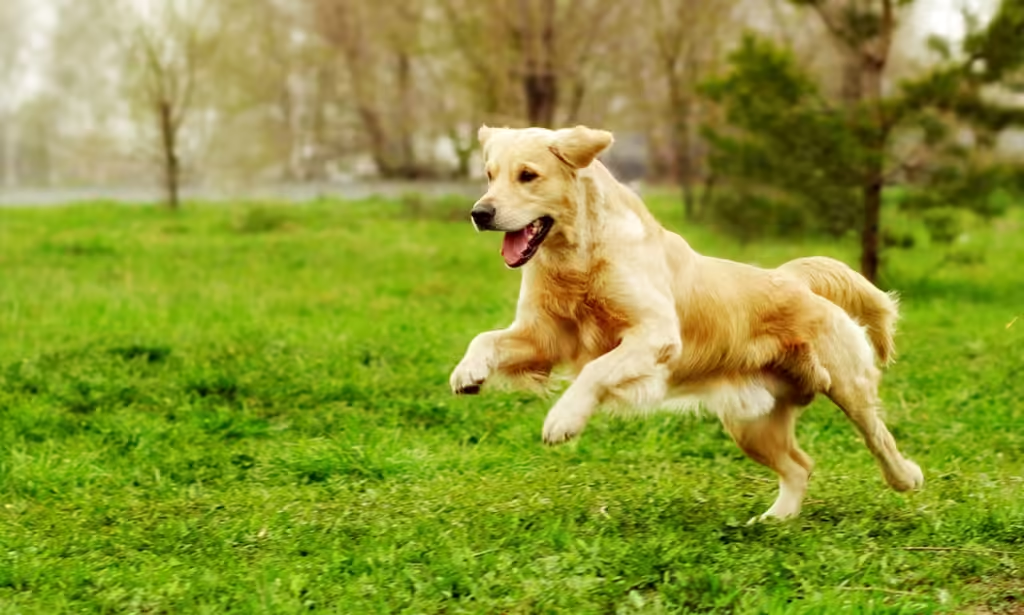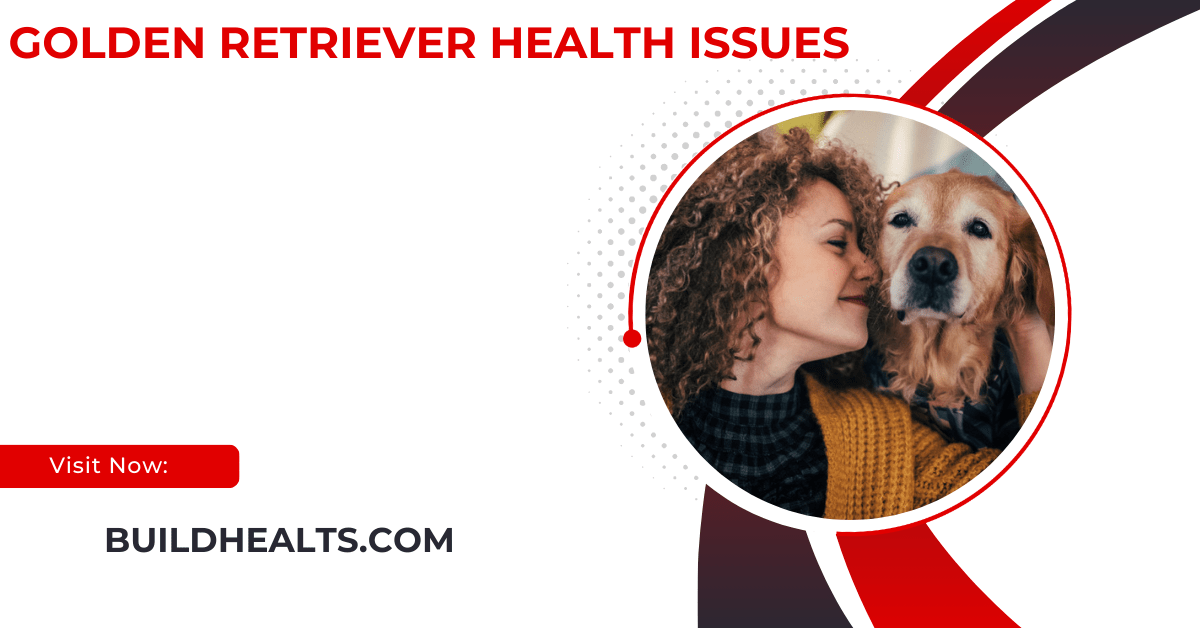Golden Retrievers are friendly family pets but are prone to health issues like hip dysplasia and skin conditions. Understanding these can help keep them healthy and happy.
Golden Retrievers are one of the most beloved dog breeds around the world. Known for their
friendly temperament and intelligence, these dogs make wonderful family pets. However, like all breeds, Golden Retrievers can be prone to certain health issues. Understanding these potential problems can help you keep your furry friend healthy and happy.
In this article, we will explore common health issues associated with Golden Retrievers, how to recognize them, and tips for prevention and care.
Common Health Issues in Golden Retrievers:

Hip Dysplasia:
What Is Hip Dysplasia?
Hip dysplasia is a genetic condition where the hip joint doesn’t fit properly into the hip socket. This condition is common in large dog breeds, including Golden Retrievers. It can lead to arthritis and pain over time.
Signs of Hip Dysplasia:
- Difficulty getting up or lying down
- Limping or favoring one leg
- Reluctance to run, jump, or climb stairs
Prevention and Management:
While hip dysplasia is often genetic, maintaining a healthy weight can help reduce the risk. Regular exercise and a balanced diet are essential. If your dog is diagnosed with hip dysplasia, your veterinarian may recommend medications, weight management, or surgery in severe cases.
2. Elbow Dysplasia
What Is Elbow Dysplasia?
Elbow dysplasia is a condition that affects the elbow joint, leading to pain and lameness. Like hip dysplasia, it is also common in Golden Retrievers.
Signs of Elbow Dysplasia:
- Limping, especially after exercise
- Swelling around the elbow
- Decreased range of motion in the joint
Prevention and Management:
Regular vet check-ups can help catch this condition early. Maintaining a healthy weight and providing appropriate exercise can also help. Treatment may include anti-inflammatory medications or surgery.
3. Skin Conditions
Common Skin Issues:
Golden Retrievers are prone to various skin conditions, including allergies, hot spots, and dermatitis. These issues can cause discomfort and irritation for your dog.
Signs of Skin Problems:
- Itching or scratching excessively
- Red, inflamed skin
- Hair loss or bald patches
- Unpleasant odor
Prevention and Management:
Regular grooming can help keep your dog’s skin healthy. Bathing your Golden Retriever with a gentle dog shampoo can reduce skin irritation. If you notice persistent skin issues, consult your veterinarian for appropriate treatment.
Also read: Is There Women Health Month – How to Take Charge of Your Health!
4. Ear Infections
What Causes Ear Infections?
Golden Retrievers have floppy ears that can trap moisture and debris, making them prone to ear infections. These infections can be caused by bacteria, yeast, or allergies.
Signs of Ear Infections:
- Scratching at the ears
- Red or swollen ear flaps
- Unpleasant odor from the ears
- Excessive shaking of the head
Prevention and Management:
Keep your dog’s ears clean and dry. Regularly check for debris and moisture, especially after baths or swimming. If you suspect an ear infection, visit your vet for treatment.
5. Heart Issues
Common Heart Conditions:
Golden Retrievers can be susceptible to certain heart diseases, including dilated cardiomyopathy (DCM). This condition affects the heart’s ability to pump blood effectively.
Signs of Heart Problems:
- Coughing or difficulty breathing
- Fatigue or lethargy
- Swelling in the abdomen or limbs
Prevention and Management:
Regular vet check-ups are crucial for early detection of heart issues. A healthy diet and regular exercise can help maintain heart health. Your veterinarian may recommend specific screenings for heart conditions as your dog ages.
Genetic Disorders in Golden Retrievers:

1. Cancer
Prevalence of Cancer:
Golden Retrievers are at a higher risk for certain types of cancer, including lymphosarcoma and hemangiosarcoma. These conditions can be life-threatening if not caught early.
Signs of Cancer:
- Unexplained weight loss
- Swollen lymph nodes
- Lethargy or decreased activity
- Difficulty breathing
Prevention and Management:
While you cannot prevent cancer entirely, regular vet check-ups can help detect it early. A healthy diet and maintaining an active lifestyle can also support your dog’s overall health.
2. Eye Problems
Common Eye Issues:
Golden Retrievers can be prone to various eye conditions, including cataracts and progressive retinal atrophy (PRA). These conditions can lead to vision loss if left untreated.
Signs of Eye Problems:
- Cloudy eyes or unusual discharge
- Difficulty seeing or navigating in low light
- Red or swollen eyes
Prevention and Management:
Regular eye examinations by your veterinarian can help detect issues early. If your dog shows signs of vision problems, seek veterinary care immediately.
Importance of Regular Vet Check-ups:
Regular veterinary check-ups are essential for maintaining your Golden Retriever’s health. During these visits, your veterinarian can perform necessary vaccinations, check for common health issues, and provide guidance on diet and exercise. Early detection and treatment of health issues can significantly improve your dog’s quality of life.
Also read: Uisp Health Ethernet Issue – Causes and Solutions!
Vaccinations and Preventative Care:
Ensure your Golden Retriever receives all necessary vaccinations. This includes vaccines for rabies, distemper, parvovirus, and kennel cough. Preventative care also includes regular flea and tick prevention, heartworm testing, and dental care.
Nutrition and Diet for Golden Retrievers:
Providing a balanced diet is crucial for the overall health and well-being of Golden Retrievers. These dogs require a diet that supports their energy levels, promotes a healthy coat, and helps maintain optimal weight. Here’s a guide to help you understand the nutritional needs of Golden Retrievers and how to create a suitable diet plan.
1. Essential Nutrients
Golden Retrievers, like all dogs, need a variety of nutrients to thrive. Here are the key components of their diet:
- Proteins: Proteins are vital for growth, muscle development, and overall health. Look for high-quality animal-based proteins, such as chicken, beef, or fish, in their food.
- Carbohydrates: Carbohydrates provide energy and are important for digestive health. Opt for whole grains like brown rice, oatmeal, and barley, as well as fruits and vegetables.
- Fats: Healthy fats are essential for a shiny coat and healthy skin. Omega-3 and Omega-6 fatty acids are beneficial and can be found in fish oil and flaxseed oil.
- Vitamins and Minerals: These are necessary for various bodily functions. Ensure your dog’s food includes a balanced mix of vitamins and minerals, such as calcium, phosphorus, and vitamins A, D, and E.
2. Choosing the Right Dog Food

When selecting dog food for your Golden Retriever, consider the following:
- Life Stage: Choose food that is appropriate for your dog’s life stage (puppy, adult, or senior). Puppies require more calories and nutrients for growth, while seniors may need lower-calorie options to manage weight.
- Quality Ingredients: Look for dog foods that list meat as the first ingredient and avoid those with fillers, artificial preservatives, and low-quality ingredients.
- AAFCO Approval: Ensure the food meets the standards set by the Association of American Feed Control Officials (AAFCO). This guarantees the food is nutritionally complete.
3. Portion Control
Golden Retrievers are prone to obesity, so it’s important to monitor their food intake. Follow the feeding guidelines provided on the dog food packaging, adjusting portions based on your dog’s age, weight, and activity level.
- Tip: Measure their food using a standard measuring cup to avoid overfeeding.
4. Feeding Schedule
Establish a consistent feeding schedule to help regulate your dog’s eating habits. For puppies, three to four meals a day are recommended. Adult Golden Retrievers typically do well with two meals a day.
5. Treats and Snacks
While treats can be a great way to reward your Golden Retriever, they should only make up a small portion of their daily caloric intake. Choose healthy, low-calorie treats or fruits and vegetables like carrots, green beans, or apple slices.
Also read: What Is Considered A Minor Health Illness – A Complete Guide!
6. Hydration
Always provide fresh, clean water for your Golden Retriever. Proper hydration is essential for their health, especially if they are active.
7. Special Dietary Needs
Some Golden Retrievers may have specific dietary needs or allergies. If you notice any adverse reactions, such as itching, digestive issues, or ear infections, consult your veterinarian for advice on appropriate dietary adjustments or hypoallergenic options.
Exercise Needs for Golden Retrievers:

Golden Retrievers are an active breed that requires regular exercise to maintain their physical and mental health. Here are some tips to ensure your dog stays active:
- Daily Walks:Aim for at least 30 to 60 minutes of walking each day. This helps keep your dog physically fit and provides mental stimulation.
- Playtime: Engage your Golden Retriever in playtime activities like fetch, tug-of-war, or swimming. These activities not only provide exercise but also strengthen the bond between you and your dog.
- Socialization: Allow your dog to interact with other dogs and people. Socialization is essential for a well-rounded and confident dog. Dog parks and obedience classes are great places for socialization.
FAQ’s
1. What are common health issues in Golden Retrievers?
Common health issues include hip dysplasia, elbow dysplasia, skin conditions, ear infections, and heart problems.
2. How can I prevent hip dysplasia in my Golden Retriever?
Maintaining a healthy weight, regular exercise, and a balanced diet can help reduce the risk of hip dysplasia.
3. What signs indicate my Golden Retriever may have a skin condition?
Look for excessive itching, red inflamed skin, hair loss, or unpleasant odors.
4. How can I keep my Golden Retriever’s ears healthy?
Regularly clean and dry your dog’s ears, especially after baths or swimming, to prevent ear infections.
5. Why are regular vet check-ups important for Golden Retrievers?
Regular vet visits help with early detection of health issues, vaccinations, and overall health management, which can significantly improve your dog’s quality of life.
Conclusion
In conclusion, Golden Retrievers are loving pets but face health issues such as hip dysplasia and skin conditions. Regular veterinary care and a balanced diet are crucial for maintaining their health. With proper attention, you can help your Golden Retriever live a happy and healthy life.




